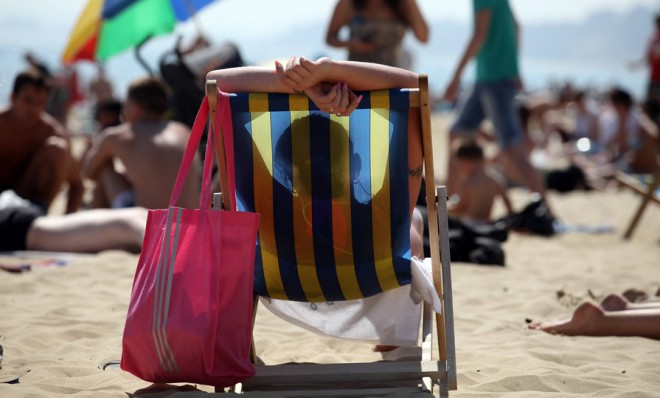
- Select a language for the TTS:
- UK English Female
- UK English Male
- US English Female
- US English Male
- Australian Female
- Australian Male
- Language selected: (auto detect) - EN
Play all audios:
Finally, some good news for sun worshipers who have withstood years of warnings about the dangers of skin cancer. Researchers in Scotland have just released a study suggesting that the
benefits of exposure to sunlight might outweigh the dangers. The news comes as the Food and Drug Administration proposes tighter regulations for tanning beds, with public health officials
saying UV-based sun lamps can boost your risk of melanoma by 75 percent. How can a force with such potential for harm actually be good for you? Here's what you need to know: HOW WAS THE
EXPERIMENT CONDUCTED? Dermatologists at the University of Edinburgh put 24 volunteers — all in their early 20s — under tanning lamps. In one 20-minute session, they were exposed to UV and
heat lamps; in another, the UV rays were blocked. After each session, the team measured the subjects' blood pressure. SUBSCRIBE TO THE WEEK Escape your echo chamber. Get the facts
behind the news, plus analysis from multiple perspectives. SUBSCRIBE & SAVE SIGN UP FOR THE WEEK'S FREE NEWSLETTERS From our morning news briefing to a weekly Good News Newsletter,
get the best of The Week delivered directly to your inbox. From our morning news briefing to a weekly Good News Newsletter, get the best of The Week delivered directly to your inbox. AND
WHAT DID THEY FIND? The researchers say sunlight lowers your blood pressure, which brings down your risk of heart disease. After the heat-lamp only sessions, there was no change. Following
the sessions with the UV lamps, however, the volunteers experienced significant decreases — 2 mmHg — in blood pressure that lasted about an hour. Prolonged dips that big, the authors of the
study say, translate to seven- and 10-percent reductions in the risk of heart disease and stroke, respectively. WOULD THAT REALLY OFFSET THE RISK OF SKIN CANCER? Possibly. Heart disease and
stroke linked to high blood pressure are blamed for 80 times more deaths in the U.K. than skin cancer. The researchers say they'll need to do more research to confirm their early
conclusions. "We now plan to look at the relative risks of heart disease and skin cancer in people who have received different amounts of sun exposure," says Dr Richard Weller,
leader of the research team. "If this confirms that sunlight reduces the death rate from all causes, we will need to reconsider our advice on sun exposure." A free daily email with
the biggest news stories of the day – and the best features from TheWeek.com HOW IS THE REPORT BEING RECEIVED? Quite cautiously. "The alarmist scare tactics may have been
overstated," says Stephen Naysmith at Scotland's _The Herald_, but this doesn't change the basic and potentially deadly fact that over-exposure to the sun can cause skin
cancer. You still need to cover up when possible. Slather on sunscreen — especially on kids — and be on the lookout for suspicious moles. And there are "still many safer ways of
reducing blood pressure" than baking in the sun, says Lindsay Abrams at _The Atlantic_. IS ANYONE CHEERING THE RESEARCH? Yes. Some say it's healthy to weigh both the pros and cons
of sun exposure, and acknowledge the good side of soaking up a few minutes' of rays every day. "Sunlight is a crucial source of vitamin D," notes Alison T. Brill at
_Commonwealth_ _Conversations, _which strengthens bones and the immune system, and can lift your mood by increasing levels of serotonin, the brain's natural mood-lifting chemical.
"The sun is a superstar in many ways," says Brill. Sources: BBC News, _Commonwealth Conversations_, _Herald_, _Science Daily_, _The Atlantic_






